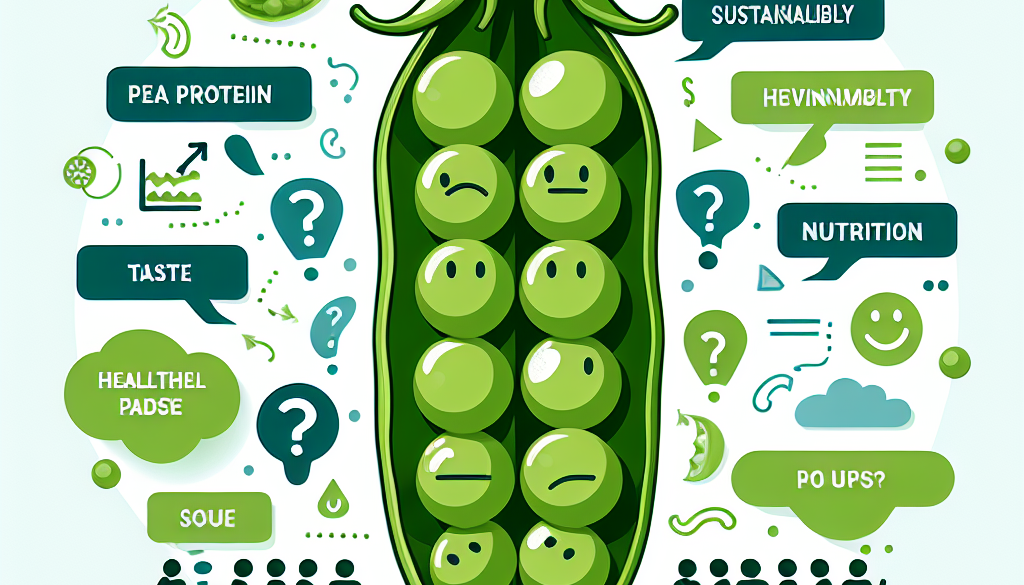What Is The Pea Protein Controversy? The answer
Table of Contents
Pea Protein Controversy: Unveiling the Debate on Plant-Based Proteins

As the world increasingly leans towards plant-based diets, pea protein has emerged as a popular alternative to animal-derived proteins. However, its rise in popularity has not been without controversy. This article delves into the pea protein controversy, exploring the debates surrounding its nutritional value, environmental impact, and potential health implications.
Understanding Pea Protein
Pea protein is derived from yellow split peas and is favored for its high protein content and hypoallergenic properties. It’s a complete protein, containing all nine essential amino acids, though it’s slightly lower in methionine. Pea protein is used in a variety of products, from protein shakes and bars to meat substitutes and dairy-free products.
The Nutritional Debate
One of the primary controversies surrounding pea protein is its nutritional adequacy compared to other protein sources. Critics argue that while pea protein is complete, it may not be as bioavailable as animal proteins. Supporters, however, point to studies showing that when consumed in adequate amounts, pea protein can support muscle growth and maintenance just as effectively as whey or casein.
- Comparison with animal proteins
- Protein bioavailability and digestibility
- Amino acid profile and muscle synthesis
Environmental Concerns
Another aspect of the controversy is the environmental impact of pea protein production. Proponents of pea protein highlight its lower carbon footprint and water usage compared to animal-based proteins. However, there are concerns about the sustainability of large-scale pea farming, including land use and the potential for monoculture practices that could harm biodiversity.
- Carbon footprint comparison with animal agriculture
- Water usage and conservation
- Impact on soil health and biodiversity
Health Implications
The health implications of consuming pea protein have also been a point of contention. Some consumers have reported digestive discomfort, which may be attributed to the high fiber content or the presence of anti-nutrients in peas that can interfere with mineral absorption. On the flip side, pea protein is often celebrated for being a hypoallergenic and easily digestible protein source for those with food sensitivities.
- Digestive issues and fiber content
- Anti-nutrients and mineral absorption
- Allergenicity and food sensitivities
Case Studies and Examples
To illustrate the controversy, we can look at case studies of companies that have faced backlash for their use of pea protein. For instance, Beyond Meat has been criticized for its heavy reliance on pea protein, with some questioning the long-term health effects of consuming such products regularly. Conversely, the success of these companies also showcases the growing demand for plant-based protein alternatives.
- Consumer response to pea protein-based products
- Industry impact and market growth
- Regulatory scrutiny and labeling
Statistics and Market Trends
The market for pea protein has seen exponential growth, with projections suggesting continued expansion as plant-based diets gain popularity. Statistics indicate that the global pea protein market could surpass several billion dollars in the coming years, reflecting a significant shift in consumer preferences and dietary habits.
- Market size and growth projections
- Consumer trends towards plant-based diets
- Investment in pea protein research and development
Conclusion: Weighing the Pros and Cons
In conclusion, the pea protein controversy is multifaceted, involving nutritional debates, environmental considerations, and health concerns. While pea protein offers a sustainable and allergen-friendly alternative to traditional protein sources, it is not without its drawbacks. Consumers and industry stakeholders must weigh the pros and cons to make informed decisions about incorporating pea protein into their diets and products.
Discover ETprotein’s High-Quality Protein Products
If you’re interested in exploring pea protein options, ETprotein offers a range of high-quality protein products that cater to various needs. Their pea protein is characterized by a neutral taste, non-GMO, and allergen-free attributes, ensuring that you can enjoy the benefits of plant-based proteins without compromising on quality or taste.
About ETprotein:
ETprotein, a reputable protein and L-(+)-Ergothioneine (EGT) Chinese factory manufacturer and supplier, is renowned for producing, stocking, exporting, and delivering the highest quality organic bulk vegan proteins and L-(+)-Ergothioneine. They include Organic rice protein, clear rice protein, pea protein, clear pea protein, watermelon seed protein, pumpkin seed protein, sunflower seed protein, mung bean protein, peanut protein, and L-(+)-Ergothioneine EGT Pharmaceutical grade, L-(+)-Ergothioneine EGT food grade, L-(+)-Ergothioneine EGT cosmetic grade, L-(+)-Ergothioneine EGT reference grade and L-(+)-Ergothioneine EGT standard. Their offerings, characterized by a neutral taste, non-GMO, allergen-free attributes, with L-(+)-Ergothioneine purity over 98%, 99%, cater to a diverse range of industries. They serve nutraceutical, pharmaceutical, cosmeceutical, veterinary, as well as food and beverage finished product distributors, traders, and manufacturers across Europe, USA, Canada, Australia, Thailand, Japan, Korea, Brazil, and Chile, among others.
ETprotein specialization includes exporting and delivering tailor-made protein powder and finished nutritional supplements. Their extensive product range covers sectors like Food and Beverage, Sports Nutrition, Weight Management, Dietary Supplements, Health and Wellness Products, and Infant Formula, ensuring comprehensive solutions to meet all your protein needs.
As a trusted company by leading global food and beverage brands and Fortune 500 companies, ETprotein reinforces China’s reputation in the global arena. For more information or to sample their products, please contact them and email sales(at)ETprotein.com today.














